
Categories:
Understanding the Basics: What is a Licensed Gun Dealer? A licensed gun dealer plays a crucial role in the process of purchasing guns legally. These dealers are authorized by the Bureau of Alcohol, Tobacco, Guns and Explosives (ATF) to engage in the sale and transfer of guns. They are required to adhere to strict regulations and maintain thorough records of all transactions.
Licensed gun dealers can operate as brick-and-mortar stores or online platforms. They undergo background checks and must comply with federal, state, and local laws regarding gun sales. This includes conducting background checks on potential buyers through the National Instant Criminal Background Check System (NICS). Additionally, they provide guidance on various aspects like gun selection, safety measures, and legal requirements.
Before purchasing a gun from a licensed dealer, it is crucial to conduct thorough research and choose the right dealer for your needs. Start by researching reputable gun dealers in your area. Consider factors such as their reputation, customer reviews, and the variety of guns they offer. Look for dealers who hold valid licenses issued by the Bureau of Alcohol, Tobacco, Guns, and Explosives (ATF).
These licensed dealers adhere to strict regulations imposed by federal law. Once you have identified potential dealers, visit their stores or websites to gather additional information. Assess their knowledge and expertise in guns sales and inquire about any additional services they offer like background checks or gun safety training.
Before proceeding with the purchase of a gun from a licensed dealer, it is crucial to understand and comply with both state and federal laws governing the process. Each state has its specific regulations that must be adhered to, which may include background checks, waiting periods, and required permits or licenses. Moreover, federal laws such as the Brady Handgun Violence Prevention Act impose additional requirements such as completing ATF Form 4473 and passing a National Instant Criminal Background Check System (NICS) check.
It is essential to research and understand these laws thoroughly to ensure compliance and avoid legal complications. Consulting local law enforcement agencies or an attorney specializing in guns law can provide valuable guidance in navigating these regulations.
Once you have selected a gun that meets your needs and budget, the next step in purchasing a gun from a licensed dealer involves completing a mandatory background check. This process is governed by federal law and aims to ensure that guns are not sold to individuals who may pose a threat to public safety. To initiate the background check, you will be required to fill out ATF Form 4473, also known as the Guns Transaction Record.
This form collects personal information such as your name, address, date of birth, and social security number. Additionally, it includes questions regarding your criminal history, mental health status, and immigration status. The licensed dealer will then submit this form electronically or via phone to the National Instant Criminal Background Check System (NICS).
Once you have selected a gun and completed the required background check, you will proceed to fill out the necessary paperwork. This paperwork includes the ATF Form 4473, also known as the Guns Transaction Record. The form collects essential information about you, such as your name, address, Social Security number, and details regarding any criminal history. Completing this form requires accuracy and honesty as any falsification of information can lead to severe legal consequences.
Additionally, some states may have additional forms or permits that need to be filled out before finalizing your purchase. It is crucial to carefully read and understand each question on the form before providing accurate responses.
Once the necessary paperwork is completed, the buyer must undergo a waiting period before taking possession of the gun. Waiting periods vary depending on state laws and can range from a few days to several weeks. During this time, a background check is conducted by the licensed dealer. This crucial step involves verifying the buyer’s eligibility to possess guns by reviewing their criminal record, mental health history, and other relevant factors.
The background check is performed through the National Instant Criminal Background Check System (NICS), which instantly searches various databases to determine if there are any disqualifying factors. If no issues arise during this process, approval is granted, and the buyer can proceed with their purchase.
Once you have successfully completed the required background check and all necessary paperwork, it’s time to finalize your gun purchase by making the payment. Licensed gun dealers typically accept various forms of payment, including cash, credit cards, and debit cards. However, it’s essential to note that individual dealers may have their own specific payment policies. Before completing the transaction, ensure that you understand the total cost of your purchase.
This includes not only the gun itself but also any additional fees such as taxes or background check charges. Once you have paid for your gun, the licensed dealer will provide you with a receipt and any relevant documentation related to your purchase.
Once you have successfully completed the necessary paperwork and passed the required background checks, you are ready to take possession of your new gun from a licensed dealer. The final steps in this process involve ensuring a smooth transfer and understanding your responsibilities as a gun owner. Firstly, carefully inspect the gun before leaving the dealer’s premises. Verify that it matches the make, model, and serial number provided on your paperwork.
Ensure that all accessories or additional items you purchased are included. Next, familiarize yourself with your state’s laws regarding transportation and storage of guns. Safely secure your gun in an appropriate case or lockbox during transport to prevent unauthorized access. Finally, educate yourself on proper handling, storage, and maintenance of guns.
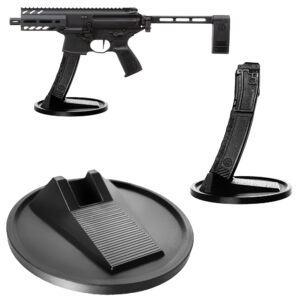
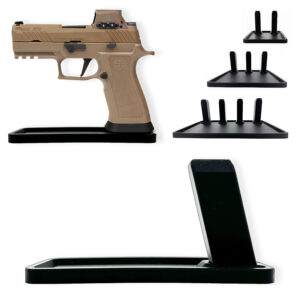
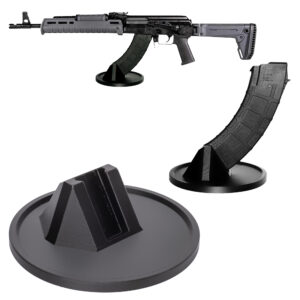


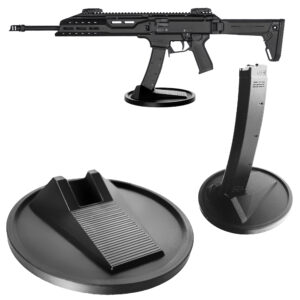
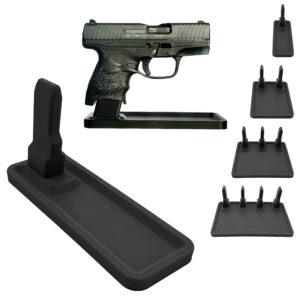

Colt
Colt M4 Carbine
Colt LE6920
Colt AR-15 A4
Daniel Defense
DDM4 V7
DDM4 V9
DDM4 V11
DDM4 ISR (Integrally Suppressed Rifle)
Smith & Wesson (S&W)
M&P15 Sport II
M&P15 Tactical
M&P15T
Bravo Company Manufacturing (BCM)
BCM Recce-16
BCM Recce-14
BCM MCMR Series
Aero Precision
M4E1 Series
AC-15
AR15 Pistol (Various Configurations)
Ruger
Ruger AR-556
Ruger SR-556
Ruger AR-556 MPR (Multi-Purpose Rifle)
Springfield Armory
Saint Victor
Saint Edge
Saint AR-15
PSA (Palmetto State Armory)
PSA PA-15
PSA AR-V
PSA Jakl (AR Pistol)
FN America
FN 15 Tactical Carbine
FN 15 Patrol
FN 15 DMR
Wilson Combat
Recon Tactical
Super Sniper
Protector Carbine
SIG Sauer
SIG M400 Tread
SIG M400 Elite
SIG M400 SDI
LWRC International
IC DI (Direct Impingement)
IC SPR
IC A5
Bushmaster Guns
XM-15 QRC
Bushmaster MOE
XM-15 Patrolman
Rock River Arms
LAR-15 Entry Tactical
LAR-15 Predator
LAR-15 Elite Comp
Stag Arms
Stag 15 Tactical
Stag 15L (Left-Handed Models)
Stag 15 Valkyrie
Noveske Rifleworks
Noveske Gen 4 N4
Noveske Space Invader (AR Pistol)
Noveske Recon
Anderson Manufacturing
AM-15 Optic Ready
AM-15 M4 Carbine
AM-15 Precision Rifle
Adams Arms
AA-15 Piston Rifle
P2 AARS (Adams Arms Rifle Series)
Black Rain Ordnance
SPEC15 Series
BRO Predator
Fallout 15
Diamondback Guns
DB15 Series
DB15CCMLB
DB15EB
Del-Ton Inc.
DTI-15
Del-Ton Echo 316H
Sierra 316M
Windham Weaponry
Windham SRC
Windham VEX-SS
Windham RMCS-4 (Caliber Conversion System)
Christensen Arms
CA-15 G2
CA-15 Recon
CA-15 Titanium Edition
Patriot Ordnance Factory (POF-USA)
Renegade Plus
P415 Edge
Revolution DI
LaRue Tactical
PredatAR
OBR (Optimized Battle Rifle)
LaRue Stealth 2.0
Battle Arms Development
Workhorse Patrol Carbine
BAD556-LW (Lightweight)
Authority Elite Rifle
Faxon Guns
Ascent AR-15
FX-19 (AR Pistol)
Streamline Ultralight Series
KE Arms
KE-15 SLT (Super Lightweight Tactical)
KE-15 Scout Carbine
Primary Weapons Systems (PWS)
MK1 MOD 2-M
MK116 PRO
MK107 (Piston AR Pistol)
ZEV Technologies
ZEV Core Elite Rifle
ZEV AR15 Billet Rifles
Franklin Armory
BFSIII AR-C1
Militia Model
F17-L (Chambered in .17 WSM)
Seekins Precision
SP15 DMR
NX15 Skeletonized Rifle
Havak Bravo
Aero Precision (Additional Models)
EPC-9 (Pistol Caliber ARs)
VG6 AR Rifles
Barrett Guns
REC7 DI
REC7 Gen II
CMMG
MK4 RCE
Resolute 300
Banshee (AR Pistol)
DPMS Panther Arms
Panther Oracle
Panther LR-308
H&K (Heckler & Koch)
HK MR556A1
HK416 (Military Variant)
Rock Island Armory (Armscor)
VR-80 Tactical AR (Shotgun AR Platform)
Troy Industries
Troy SPC-A3
Troy PAR (Pump Action AR)
Wilson Tactical
Tactical Recon AR
Protector Series
F1 Guns
FDR-15 Skeletonized Rifle
BDRx-15 Series
Juggernaut Tactical
JT-15
JT-10 Precision Rifle
AeroSurplus
Surplus AR-15 Rifles (Budget Models)
Thunder Tactical
AR-15 Basic Carbine
Tactical Builder Sets
Radical Guns
RF-15
Forged AR-Series
Dark Storm Industries
DS-15 Featureless Rifles
DS-10 Typhoon
DRD Tactical
Paratus
Aptus AR Rifles
Bear Creek Arsenal
BCA-15
AR Complete Upper Builds
Aero Survival Rifles (ASI)
ASR Tactical Series
Tactical Edge
WARFIGHTER Series
AR-15 Lightweight Rifles
Lone Star Armory
TX15 DMR
TX15 Carbine
HERA Arms
HERA H7
HERA AR-15 Lower Builds
IWI (Israeli Weapon Industries)
Zion-15
DRD Tactical
Tactical Modular Rifles
Quick-Takedown Rifles
V Seven Weapons
1776 Rifle
Hyperlite Rifle
Core Rifle Systems
Core15 Tac III
Core15 Patrol Rifle
Armalite (Original AR-15 Creator)
M15 Tactical
M15 A4 Carbine
DEF15 (Defensive Sporting Rifle Series)
PSA (Palmetto State Armory Additional Models)
PSAK-47 Hybrid (AR-AK Style Hybrid)
PSA Dagger (Pistol Caliber Configurations)
Odin Works
OTR-15
Odin Recon Rifle
Maxim Defense
MDX-508 PDX (Compact AR Pistol)
MDX-510 Rifle